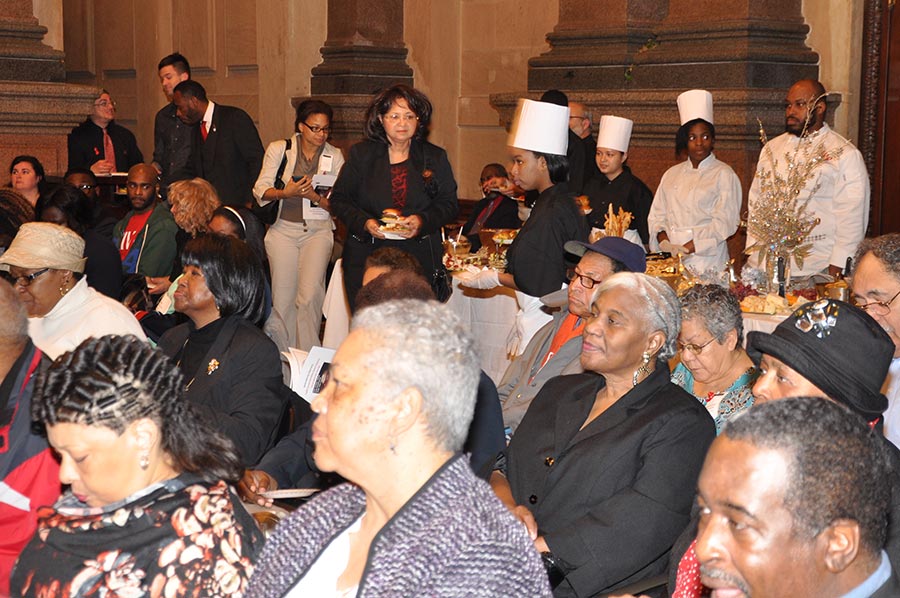When Terrie Hawkins took to the podium in Philadelphia City Hall Tuesday night, she called her son and daughter up with her. The 15-year veteran of AIDS Fund wanted to share her D. Rick Britt Red Ribbon Award with her children, who earned the same recognition last year.
Hawkins thanked the HIV/AIDS organizations in the city that work together. In addition to her work with AIDS Fund, Hawkins provides HIV and Hepatitis C testing and counseling to people at Prevention Point Philadelphia, and assists with the organization’s shelter program and needle exchange.
Four others received Red Ribbon Awards for HIV/AIDS work: Dr. Marné Castillo for research, Pearl Gould for faith leadership, Dr. Helena Kwakwa for community leadership and Ann Ricksecker for policy-making. Their peers in the field nominated them for the honor.
About 100 people attended the 12th-annual, three-hour award ceremony in Conversation Hall, held each year to commemorate World AIDS Day.
Most Red Ribbon recipients had an emotional connection to their work. Gould had a close friend whose son was diagnosed with the virus in the 1990s. She traveled to California to help care for him and noticed that people viewed the disease as a kind of “leprosy” that was associated almost exclusively with the gay community. Patients often felt isolated and didn’t receive visitors in the hospital, she said.
When Gould returned to Philadelphia, she established a 24-hour hotline out of her house. People with HIV were encouraged to call any time they wanted someone to talk to.
“People weren’t feeling upset and alone just between the hours of 9 a.m. and 5 p.m.,” Gould said. “And people did call at all hours.”
She also established the HIV/AIDS Caring and Sharing Ministry at Mount Carmel Baptist Church in West Philadelphia, considered a bold initiative among black churches at the time.
Dr. Michael Blank with the Center for AIDS Research at the University of Pennsylvania, which presents the Red Ribbon Awards, told PGN it’s important for the community and scientists to have a strong relationship.
“The community informs us as far as what research we should be pursuing and how to make it relevant to Philadelphia,” Blank said.
Keynote speaker Dr. David Holtgrave serves as vice-chair of the Presidential Advisory Council on HIV/AIDS. He noted only a third of the 1.2-million HIV-positive Americans have access to proper care. Holtgrave shared with attendees highlights from the updated National HIV/AIDS Strategy, which was released in July and runs through 2020. The first strategy came out in 2010.
Holtgrave said the updated strategy highlights four goals: reducing new HIV infections; increasing access to care and improving the health of people living with HIV; reducing HIV-related disparities and health inequities; and creating a more coordinated national response.
To achieve these goals, the strategy focuses on widespread HIV testing; support for people living with HIV to remain in comprehensive care that supports adherence to treatment; universal viral suppression to prevent people with HIV from transmitting it; and broad access to pre-exposure prophylaxis, called PrEP, and related services.
“It’s a policy document, not an appropriation document,” Holtgrave said, noting it is important for advocates to come up with cost estimates for executing each strategy and push for funding.
Dr. Ron Collman also addressed the crowd. He took over as the director of the Penn Center for AIDS Research on World AIDS Day, after serving as co-director.
“As a gay man, I saw this virus devastate entire communities,” said Collman, who does molecular work with HIV. But he said his mind never wanders far from the people affected by his research.
“We have to keep in mind that our goal is ultimately to improve the lives of people affected by this epidemic,” Collman said.
